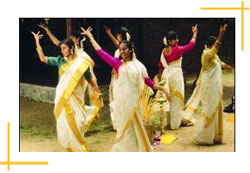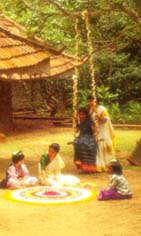|
Thiruvathira
Thiruvatira is the women's festival of Kerala. It is celebrated in the
Malayalam month of Dhanu. The popular conception of this festival is that
it is the commemoration of the death of Kamadevan; the cupid of our national
mythology. 
Kamadevan was destroyed in the burning fire of the third
eye of Lord Siva; one of the chief members of our Divine Trinity. Hence
he is now supposed as having only an ideal or spiritual existence. He
exerts a powerful influence upon the passions of human nature. In earlier
days, the festival used to be celebrated as follows: About a
week before the festival practically opens, at about 4 in the morning
every young female member of the Nair families, gets out of her bed and
takes her bath in the pond. A fairly large number of these young ladies
collect themselves in the pond for the purpose. Then they plunge into
the water and begin to take part in the singing. One of them then leads
off by means of a peculiar rhythmic song chiefly pertaining to cupid.
The singing is simultaneously accompanied by a curious sound produced
with the hand on the water. The palm of the left hand is closed and kept
immediately underneath the surface of the water. Then the palm of the
other is forcibly brought in the slanting direction producing a deep loud
noise. This process is continuously prolonged together with the singing.
One stanza is over, along with the sound and then the leader stops a while,
for the others to follow her in her wake. This continues until the conclusion
of the song. Then all of them make a long pause and then begin another.
The process goes on until the peep of the dawn, when they rub themselves
dry and come home to dress themselves in the neatest and grandest possible
attire. They darken the fringes of their eyelids with a sticky preparation
of soot mixed up with a little oil or ghee and sometimes with a
superficial coating of antimony powder. They also wear white, black or
red marks, lower down the middle of their foreheads close to the part
where the two eyebrows near one another. They chew betel and thus redden
their mouth and lips.
Then they proceed to the enjoyment of another prominent item known as Oonjal (swing). A long
bamboo piece is taken and cut from the root end of it leaving the
other end whole untouched. Then the two holes are bored. One on the cut
end of each one of the two parts into which the bamboo is split. A small
piece of the same, material about a yard in length is divided along the
gain in two equal parts. One of these is taken and its both ends are cut
into points which are thrust into the holes of the long bamboo piece.
This is securely nailed and strongly attached to the long bamboo.
It is then hung by a very tight strong rope to a horizontal branch of
the neighbouring tree. Then the player seats herself on the small piece
attached between the split positions which are firmly held by her two
hands. The whole thing is propelled upwards by someone from behind. The
ladies drive immense pleasure from their process of swinging backwards
and forwards.
the enjoyment of another prominent item known as Oonjal (swing). A long
bamboo piece is taken and cut from the root end of it leaving the
other end whole untouched. Then the two holes are bored. One on the cut
end of each one of the two parts into which the bamboo is split. A small
piece of the same, material about a yard in length is divided along the
gain in two equal parts. One of these is taken and its both ends are cut
into points which are thrust into the holes of the long bamboo piece.
This is securely nailed and strongly attached to the long bamboo.
It is then hung by a very tight strong rope to a horizontal branch of
the neighbouring tree. Then the player seats herself on the small piece
attached between the split positions which are firmly held by her two
hands. The whole thing is propelled upwards by someone from behind. The
ladies drive immense pleasure from their process of swinging backwards
and forwards.
On the festival day, they take a morning bath and in
the noon a grand lunch is served. The essential ingredients of it is being
ordinary ripe plantain fruits and a delicious preparation of arrow-root
powder purified and mixed with jaggery or sugar and also coconut. The
women spend the whole night singing and dancing.
Thiruvathirakali also known as Kaikottikkali is
a dance in which a group of women dance in a circle around a lighted brass
lamp. They are dancing to the rhythms of the songs they sing. They wear
the traditional dress, consisting of two pieces, dhoti and an upper garment
across the breast and look elegant and sprightly for the game. The leader
of the group sings the first line which is repeated by the group to the
simple rhythm of clapping hands. There are many songs which are exclusively
sung as Tiruvathira songs, popular Kathakali songs are also included.
The kinetic phrases are so simple that any new comer easily gets initiated
to the game. This dance form had been keeping its basic posture for centuries.
The bent of the body, hand movements and dance gestures are common to
the region.
'Ettangadi chuduka' is an important ritualistic
act of women. On this day, eight different tubers are roasted in the fire.
Through this ritual, it is believed that Kamadeva's body represented by
the tubers is regained. This delicious preparation known as Thiruvathirappuzhukku,
a special dish prepared by these tubers forms the main item for lunch.
In some places, women spend the whole day taking no food except this preparation.
The night long music and dance is interspersed with a ceremony called
Patirappoo choodal. It is a ritualistic wearing of flowers at midnight.
An image of Shiva is placed in the centre of the courtyard in front of
lighted brass lamp where flowers, plantains, and jaggery are offered to
the deity. The women perform the dance around the image and each participant
adorns a few flowers from the offering and have the arrowroot preparation
of puzhukku and tender coconut milk, which are the items of the food.
The morning bath during the season while the climate
is extremely cold make the women's body cool and composed. Apart from
the religious significance of the day, the women of Kerala enjoy good
exercise and entertainment on this day. After the midnight, ritual of
adorning with flowers, the dance and music continue till sunrise. The
participants take the morning ablution and with it they conclude the festival.
|


